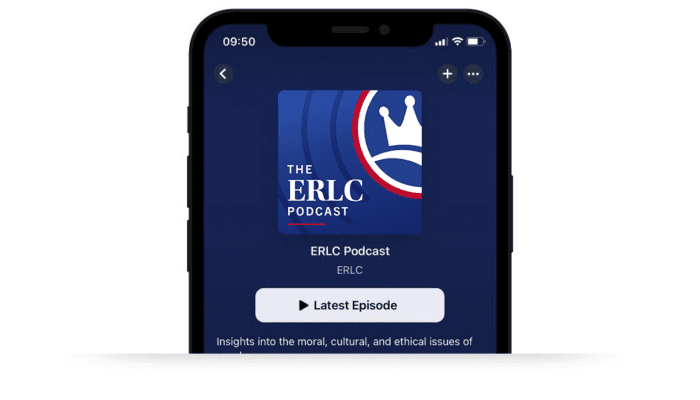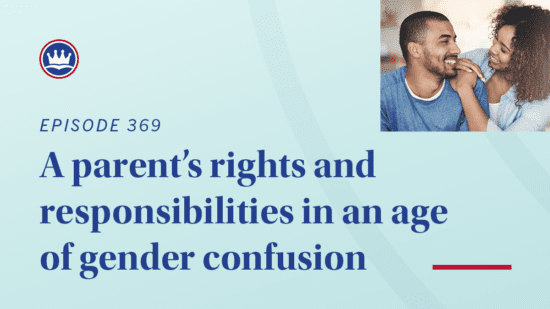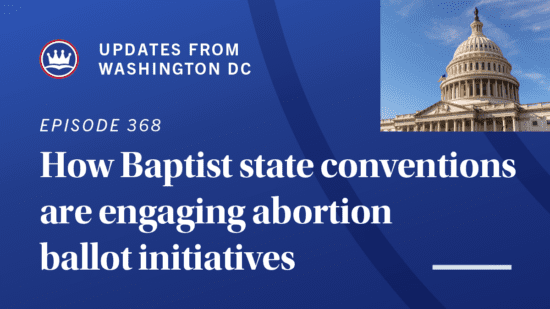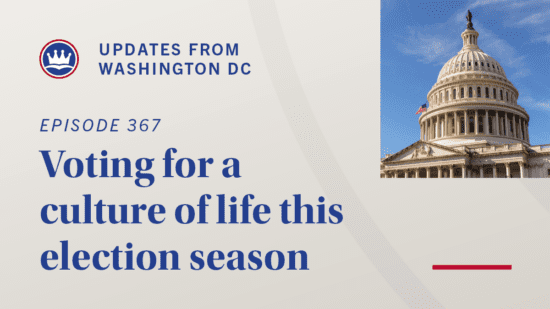This week we’re featuring a special election episode on what the 2024 election results mean for SBC advocacy. Election Day 2024 was one for the history books. President-elect Donald Trump was decisively returned to the White House by voters. A surprise given how close many commentators thought the race would be. Likewise, there was a Republican sweep in the House and Senate. In addition, the ERLC was closely watching 10 states with abortion ballot initiatives of those three states secured pro-life protections for the pre-born, while sadly, the seven other states enshrined pro-abortion legislation into their state constitutions.
On today’s episode, you’ll hear from ERLC President Brent Leatherwood and our policy director Hannah Daniel. They’ll talk about the results of the election, the importance of continuing to stand for the value of every preborn life and the good work we have the opportunity to accomplish with a new administration and Congress.
Episode Transcript: What the 2024 election results mean for SBC advocacy
Brent Leatherwood
Prior to the election, there were voices all around the political spectrum that were saying that democracy is on the ballot. And what’s funny about that is I would say it’s always on the ballot because the very fact that we have elections that American citizens are able to participate, prove that fact. And the great news is that we came through in flying colors, individuals were able to vote on all sorts of offices from the top of the ticket with president all the way down to local offices and state matters like these abortion ballot questions. It’s important that Americans take that right and that privilege of getting to weigh in on these offices and on these decisions. Very importantly, that’s why ahead of the election, we at the ERLC, were trying to do all that we could to educate voters in all 10 of those states about the issue of abortion and how they had a unique opportunity in this post row world that we’re in to take a stand for life with their vote and praise God in three different states.
The pro-life viewpoint actually prevailed because voters said, you know what? We’re not gonna go in the direction that Planned Parenthood and its affiliates and the abortion regime want us to go. Instead, we’re gonna go in the direction of life in seven other states. However, the abortion viewpoint, it prevailed and in states like Missouri, now, a very pro-choice perspective is now gonna be enshrined in their constitution. A lot of them were actually amending their state constitutions. This represented in many ways, a once in a generation effort that was before these voters. And we have to acknowledge the reality that the pro-life movement in these states, it outspent some cases, six to one, seven to one, even 10 to one in one state. That shows you how deeply invested the abortion forces were in these efforts. But again, the good news is we’ve got three states that didn’t go that direction.
We at the ERLC, our pro-life partners, we’re gonna be examining those results for lessons about the way forward. We should also be very clear-eyed that there are challenges ahead. The abortion industry is going to try this again in 2026 and in 2028, we’re gonna have to be prepared for that. I know that in a number, well, actually in all 10 of those states, Southern Baptists were engaged. Pastors were talking about this issue from the pulpit. They were talking about the ability to stand from life. I’m so thankful that Southern Baptists pro-life believers, that they were acting in a way that shows that they’re trying to live out the tenets of our faith and why it has something to say about public policy matters.
Hannah Daniel
I think these initiatives are great examples of the responsibility and stewardship that we have as citizens. It’s so easy to think about public engagement and voting just as in electing a president or maybe sending leaders to Congress. But I think these initiatives can remind us that local elections, those are really where we are making an impact on our direct community. We’ve got to be engaging with our community, engaging with our neighbors, talking about these issues, and then going and voting on them in a way that represents the beliefs that we hold to so that we’re not just focusing on a big scale federal picture, which is important, but also really paying attention to where our feet are actually planted. And one thing that I think we can really take from this election cycle where we’ve seen abortion on the ballot in 10 different states, is that we have got to be proactively engaging with voters, engaging with our neighbors on these issues.
We’ve seen the pro-abortion side use this as a mechanism to push forward pro-abortion laws undo pro-life laws across all kinds of different states, both red and blue. And so we have to work under the assumption that this could be coming to our state, even if it’s not already on the ballot. How can we go ahead and begin proactively engaging with people, helping them understand this issue, laying a foundation for it ahead of this actually being on our ballots? And I think churches can play an essential role in laying that foundation that all people are created in the image of God and have immeasurable worth and dignity and value. And from that foundation then we can talk to our neighbors about the realities of abortion we can serve in our communities and help women feel supported and empowered to keep their pregnancies. And I think the other piece of this is countering misinformation, which has been rampant since the Dobbs decision. We’ve seen all kinds of stories about women not being able to get medical care that they need. And so often this is not being accurately portrayed. There is no abortion law on the books that prohibits a woman from getting care for a miscarriage or anything like that. And so we’ve got to be putting out correct information, countering some of this misinformation that gets weaponized by the pro-abortion side to say, no, we do want women to be protected, and they are. But we also want pre-born lives to be protected as well.
Lindsay Nicolet
We celebrate that three states, Florida, Nebraska, and South Dakota saw victories for the pro-life movement protecting both pre-born babies and vulnerable mothers. How do we keep up the momentum from these wins helping ensure that the pro-life movement doesn’t become complacent? And on the other hand, what can we learn about the tragic losses in the other seven states? Brent and Hannah speak to this with truth and compassion.
Brent Leatherwood
I think overall, actually that might be part of our issue. We have been so singularly focused for 50 years on overturning Roe, but we accomplish that. And I think a lot of people understandably say, we’ve met our goal. But that’s exactly why once we had the Dobbs decision, which is the court case that overruled Roe v. Wade, that is why in the messaging of the ERLC, we were very clear. This is an incredible achievement. But this just marks the end of this chapter. There’s a new chapter that we’re now in where we’re really going to have to proactively fight for life. And through the way that the Dobbs decision came down at the Supreme Court, we’re gonna have to fight for life at the state level. I think there is maybe some complacency there that we’re just gonna have to help people overcome and get re-engaged.
And you know, through those three states, the reality is they beat back an effort to advance abortion. And again, we should celebrate that. But it doesn’t further enshrine a culture of life. It’s an important marker, but it doesn’t take us in positive steps in the direction of life. And that’s where I think we need to concentrate our efforts. So in a state like Florida in South Dakota, I am hopeful that our state Baptist partners in those states, pro-life partners are going to be working with public officials there to say, okay, we thwarted this effort from the pro-choice forces. What can we do to actually advance the ball forward when it comes to life? Do they need to consider their own legislation or maybe even their own constitutional amendment to enshrine an inherent right to life there? I think that is absolutely all on the table, and that’s the nature of the conversations we need to be having with these new legislative sessions that will begin in the New Year.
Hannah Daniel
In the states that did have pro-life wins, we have to think about how we can move forward in a pro-life, pro-woman, pro-family direction, whether that is serving at pregnancy resource centers in our communities or engaging even with our state lawmakers and state level legislatures on pushing forward pro-family, pro-women policies. Many of these states already have significant pro-life laws on the books. But could we push for an even stronger pro-life law, or could we push for a pro-family law that gives assistance needed to vulnerable moms and families who are going to be keeping these children? How can we come alongside those who are working in adoption or foster care in these states? And so the states that have gotten wins, we want to rejoice there, but we also know that we can’t stop while also working with states that did not have victories. How can we come alongside those states even if life is protected on our own, we know that many women will just simply go to a different state to have an abortion.
How can we continue to put pressure on our state lawmakers, our federal lawmakers to see the issue of life as a priority? I think at a foundational level, what we have to learn from this is that we cannot assume that people are with us, that people understand this issue even among fellow believers. We have to go back to the foundation that all people are created in the image of God, and that the pre-born child is a child. We have to recognize the humanity of the child in the womb and work to educate our own people in our churches, and then from there, educate our broader communities on this reality. And I think that’s gonna take some real unity in the pro-life movement, unity in our churches. It’s so easy for us to get caught up in divisions over strategy. I think we have to kind of take a complete step back and say, no, we have to get back to the basics. And it’s only in changing people’s hearts and minds on this issue that we will ultimately change legislation or our laws. We can’t force progress in that arena without also seeing changes in people’s attitudes and minds and hearts on this issue.
Lindsay Nicolet
Christians and churches should be at the forefront of the pro-life work still to be done because we are bound to and believe the truth of God’s word, that he knit us together in the womb and calls us valuable. Here are Brent and Hannah, with some strategies we can employ to help promote a culture of life, both nationally and locally.
Brent Leatherwood
In a probably a very elemental way. We’ve gotta get back to the basics. In many ways, I’ve described it as trying to return back to that moment when ultrasound technology first came on the scene and pro-life believers, pro-life ministries such as our pregnancy support centers across the country used that technology in a very revealing way for mothers that were coming in with questions about whether they were pregnant and what to do. And those ministries used that technology to show the full humanity of the child in the womb. I think there’s a real opportunity there, and I think we’ve also got to show these vulnerable mothers, these scared fathers that we’re willing to walk alongside them. Statistics show that so many abortions, it comes down to the mother feeling that she’s not gonna be supported, whether that is financially within a family, socially within a community. And we’ve got to be willing as Christians to walk alongside these mothers. Not just tell them, but prove that there is a different direction than what Planned Parenthood promises, which is the direction of death. We’ll just take care of this problem that you have. I talked before about the ways that we were outspent across these 10 states. We’re gonna also have to be engaged financially.
Hannah Daniel
So often children are viewed as an inconvenience or something that gets in the way of our goals and dreams or something that annoys us on an airplane or at a restaurant when we would rather it be quiet. But I think we as a nation have to say, no, children are a blessing and we are going to create a culture that values them. And that wraps around moms and parents who have children, and especially young children. How can we better support the needs of those moms and parents, especially in those critical early years, we actually have data that oftentimes parents are choosing to have less children than they even desire to have because they think it’s just going to be too difficult or too hard. Or the economic factors. Or the cultural factors. So what if we as the church, as the pro-life movement as a nation said, no, we want to have children.
We think they are unequivocally a good to society and a blessing from the Lord, and then work to create a culture that truly reflects that. And so I think tangibly that looks like us all stepping up to care for the people in our lives who are having children, whether that was planned or unplanned and helping meet their needs, whether that is diapers for a new child or helping out with childcare or whatever that may be. We all have something we can do to come alongside women and children who are particularly vulnerable and work to create a nation and a culture that truly values children, that truly values life.
Brent Leatherwood
At the church level, we’re gonna have to truly preach the gospel and to help people understand what it is the gospel has to say about life. And it’s not just gonna be one sermon series, it’s gonna have to be a constant. That’s how we’re ultimately going to build up congregations and communities and ultimately our entire states back to a place where citizens will have the opportunity to stand for life. But it’s not gonna happen overnight. And so there’s gonna have to be a forbearance here that Southern Baptists and our fellow Christians are just gonna have to live by and work hard to bring us closer to that opportunity to stand for life.
Lindsay Nicolet
The other big news from Election Day was President Trump’s victory over Vice President Harris. With new leadership, there are opportunities to protect religious liberty and champion God’s design for marriage and family. However, there are some challenges to passing legislation, stopping government funding of abortion and holistically protecting preborn life at a federal level. Brent and Hannah explain how we can unwaveringly advocate for stronger pro-life policies in the new Trump administration.
Brent Leatherwood
I’m hopeful on this front. I acknowledge that as President Trump was conducting his campaign, he was not casting the robust vision for life that we would prefer. But at the same time, he has an opportunity to appoint a number of individuals in very consequential and strategic places throughout the federal government that speak into policies touching on life. And so we’re planning to engage with the transition team. As a matter of fact, we’ve already created a document that we’re gonna be sharing with his transition team about several policy areas that we think represent fairly easy and simple wins that should be a part of his initial governing agenda. Whether it’s the first day, first week, first a hundred days, these are wins that I think will touch in the area of life and will actually say pre-born lives. And a part of that is choosing the right personnel.
There’s an old saying in Washington that personnel is policy. And so we would urge the incoming Trump administration to identify pro-life individuals that have a heart for good, thoughtful, constructive policy that saves lives. As we have those conversations with the White House, just as we always do, we’re gonna help them and folks around them understand that the federal government still has an incredibly important role to play when it comes to the issue of life. We believe that the right to life is already there in our founding documents in our constitution through the 14th Amendment. And so obviously the federal government can help bring about that recognition.
Hannah Daniel
We really have a unique opportunity for advancement on the issue of life. Working with the Trump administration and working with this new Congress, we really are hopeful for what can be accomplished on the cause of life in these next four years. That’s not to say that there won’t be challenges. We saw earlier this summer when the GOP platform was changed to kind of take out a historical stance against abortion. And so we’ve seen congressional leaders, we’ve seen President-elect Trump that they will not sign a federal abortion ban. That doesn’t mean we won’t continue to advocate for that and in that direction, but it does mean that we will have headwinds on this issue. However, I do think there is still a lot of progress that can be made here. And so some of the things that we are going to be advocating for that we want to be working alongside Congress, working alongside the Trump administration towards would be taking away funding that’s going to abortion providers.
We have a law that’s called the Hyde Amendment that’s passed every year within our appropriations bills. That means that federal taxpayer dollars cannot go directly to abortion. However, millions and probably billions of dollars are still going to organizations like Planned Parenthood. They can use that money to fund other things as long as it’s not just directly abortion. And so there’s a lot that President Trump could do both domestically and internationally to make sure that those abortion providers are not receiving federal dollars. The administration could also do much in terms of undoing some of the really harmful policies from President Biden. On the issue of life, president Biden has used every regulatory tool available to him to push forward a pro-abortion agenda. And so we are going to be urging President Trump to quickly move to undo some of those actions. And then finally, I think working with both President Trump as well as with Congress, we are gonna be pushing for legislation that is pro-life, that is pro-family thinking about how we can help parents, how we can support the work of pregnancy resource centers, how we can make adoption more affordable and accessible, how we can assist those who are directly helping women in need.
I really am hopeful for the days ahead on this issue. And I believe that there’s a lot of good work that can be done as we try to protect preborn lives as well as serve mothers and parents. And I’m excited about what could be done at a policy level, but also at a cultural level as well in support of that goal.
Lindsay Nicolet
Once leaders are elected, it can be tempting to sit back and watch what happens while they’re in office, but that’s not the way life and the public square should work. Here’s Brent with a closing reminder about how Southern Baptist can be a part of holding our elected leaders accountable and seeing a true culture of life established in our country.
Brent Leatherwood
There’s a whole new crop of legislators at the federal and state level that were elected. And I would encourage folks to get to know them and understand where they are on the issue of life and offer them encouragement to push policies that protect life legislators, particularly at the state level, they’re very impressionable. They actually want to hear from individuals too often. They make incorrect policy choices simply because nobody’s engaged them on an issue. It’s a little bit different in Congress where outside organizations are blasting them all the time about their various issues. But at the state level, honestly, there tends to be a vacuum there. And I think that vacuum should be filled with pro-life voices from believers all across those states. And so meet them in their district and say, Hey, I, I just wanna talk to you about the issue of life and what we can do to help our state move forward in protecting life and recognizing the dignity of our pre-born neighbors.
That’s an important conversation that must be had by individual citizens and certainly individual Christians. And I think that’s the way I’d go about it. And at the same time, don’t hear me say that members of Congress are off limits. No, they need that kind of engagement too. And they will be sworn into office at the top of the new year. So they’re doing a lot of organizing meetings. We’ll be up in Washington here soon, meeting with several of them, and they need to hear from citizens as well. What can we do to move this nation in a better, more constructive, pro-life direction? Don’t be shy. Send ’em a letter, send ’em an email. They’ve got their contact on their websites for a reason. Utilize that. If we do that, they hear from enough of us. We can truly start to shape and move policy in a direction that we would like to see, that we know is consistent, not just with our faith, but with the promise that is America. That each person is endowed by our creator with the right to life. And so that’s how we move the ball forward. It’s important work and it’s gotta be done.
Lindsay Nicolet
We can’t predict what the next four years hold, but we can be optimistic without idealizing the state of our politics. On the other hand, we can be a little nervous but not combative and filled with fear. The tension we hold as Christians is somewhere in between because we know God has established and is over governments, but we also know they will be imperfect until Christ comes to rain once and for all. So let’s be thankful for the victories prayerful about the work still to be done and relentless in proclaiming the hope of the gospel and the truth of God’s word in our communities.
Thanks for listening to the ERLC podcast. Join us next time as we continue our series on marriage and family.













